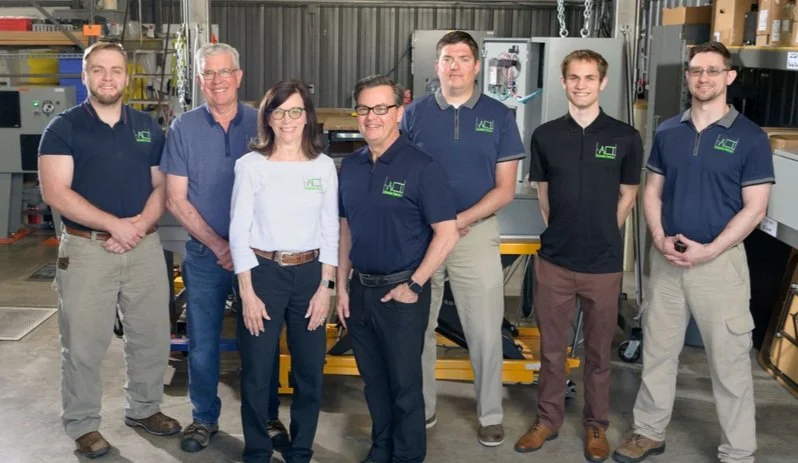BUSINESSES BEHIND THE SCENE: Automation Controls Inc.
Photos by JASON DAILEY
As a systems integration company, Automation Controls Inc. (ACI) helps manufacturers keep their production lines up and running by engineering, building, and starting up a turnkey solution to replace their obsolete control systems. They begin by evaluating a company’s specific integration needs and then design a comprehensive control system, making sure it meets all space and heat specifications.
Once the system is designed, they build the control panel and power test it, and then write, download and test the programmable logic controller (PLC) program. After the human machine interface (HMI) is built, they pretest the whole system in their shop prior to installation and start-up. Their current HMI upgrades, include redundant servers that also provide a means for ACI to remotely support the manufacturing plant 24/7 to reduce downtime.
All that just means that they allow operators to monitor their processes with reliability and efficiency, something that Regina Brown, co-owner of Automation Controls, learned to appreciate firsthand when she helped Frito-Lay develop its SunChips line.
“Keeping the line running while maintaining quality control is essential in manufacturing,” Regina said. “If your machines aren’t running right, all of that product just becomes waste.”
A MANUFACTURING PATH
While Regina and her husband, Paul, both have manufacturing backgrounds, they didn’t set out to begin a systems integration business. These high school sweethearts headed off to K-State with a plan to marry after they finished college. After his sophomore year, Paul, who was majoring in electrical engineering, decided to pick up a double major in milling science, which would add another year of college. Regina didn’t want that extra year to be wasted, so she also double majored in business and baking science.
With four degrees between them, they headed off to Texas to begin their careers — Regina as a food scientist at Frito-Lay and Paul as an engineer for Cargill. As a member of the SunChips development team, Regina helped Frito-Lay bring up four new SunChips lines in four different plants, in just under six months.
Paul, who had left Cargill and was working for a company that provided automation services, was often traveling as well, as his company had a national vendor contract with Frito-Lay. He too got pulled into the SunChips start-ups and did the integration for the Charlotte, NC plant, and later SunChips in Korea.
“It was like we became ships in the night,” Regina said. “I remember meeting him in the airport one time to just hand off the kids and then we were off again.”
With three young children to care for, Regina decided to leave her position at Frito-Lay. Two years later, Paul also left his job, and started Automation Controls in 1995. Wanting to move back home, Paul and Regina returned to Valley Falls that same year. Originally, Regina had no plans to be part of the business, but after three years of sending Paul out on the road, she had an epiphany: if she joined the company, they could take the kids and go on the road together.
A PATH TO SUCCESS
Automation Controls found its first customers at amusement parks and Frito-Lay Topeka. They built control panels and designed and programmed safety systems on roller coasters across the country.
They also did local projects for Frito-Lay. Business was good. They didn’t see a need to grow beyond what the two of them could handle.
Then 9-11 happened. Almost overnight the amusement park work began to dry up. They still maintained the 22 systems they had put into place, but new amusement rides moved overseas. Insurance dropped them because of the risk associated with the amusement park work. Three weeks of scrambling finally resulted in new insurance coverage, but only for their manufacturing projects.
“Thank God for our connections,” Paul said. “Frito-Lay was one of our first customers and has been a sustaining partner for us.”
Word of the quality of the services they provided began to spread and they picked up additional manufacturing clients including Cargill, Smucker’s and Russell Stover Candy. Business was once again stable, and the future looked bright.
Then the 2008 recession hit, and business once again dried up. They reached out to existing customers such as Frito-Lay to see if they could pick up additional business. Once again, that relationship sustained them. They began traveling to other Frito-Lay locations, providing software solutions, and performing system upgrades for a few smaller customers.
“Our customers have been phenomenal to us,” Regina said. “They gave us small projects that helped keep us afloat during that time.”
Surviving a second downturn made Paul and Regina re-evaluate their business model and put more emphasis on growth and diversification. They hired additional employees and more actively pursued business opportunities they hadn’t considered before.
“You know what people still buy during a recession? Chocolate and pet food,” Regina said.
So that is where they turned their marketing focus. They also learned that helping someone who is in trouble, even if they are not your customer, will pay dividends in the long run.
“Manufacturing is essential to Topeka,” Paul said. “We want to do everything we can to keep it healthy and operational. It makes Topeka better for all of us.”
In addition to helping manufacturers in Topeka stay operational and efficient, Paul and Regina see it as their mission to help train the next generation of system integrators. They have partnered with Washburn Tech to train interns inhouse on the intricacies of the business. To date, Automation Controls has trained nine interns, both engineers and technicians.
“We feel it is our duty to make sure there are enough people trained to support manufacturing,” Regina said. “Manufacturing is in our hearts. It hurts when we have a plant down because we care.”
A COMMON DENOMINATOR
Paul and Regina view their company as a common denominator between manufacturing companies in Topeka. When they implement a new system for a customer, when allowed, they keep the old system parts because they can be useful for someone else if a system goes down and those parts aren’t readily available anywhere else.
“Companies know we probably have a part if they need it right away just to get them operational until they can get their own replacement parts,” Paul said. “It doesn’t matter if they are our customer or not. If they need us, we will help them out.”
Automation Controls helps manufacturers manage the software and control panels that run their machines, but what happens when one of those conveyors breaks or a mechanical failure shuts down a processing machine? The entire operation comes to a standstill, throwing off production schedules and eroding already thin profit margins. And if the lines are down, it has a snowball effect very quickly. The workers get sent home, so their pay is affected hitting their families bottom line too.
That is where R&S Maintenance comes in.









